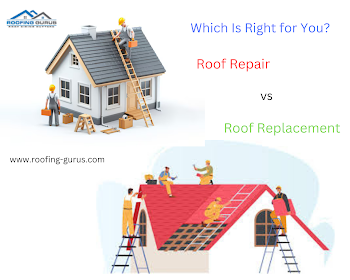Roofing Repair vs. Replacement: Which Is Right for You?
- Get link
- X
- Other Apps
When your roof begins to show signs of damage, the decision between roof repair and replacement can be overwhelming. Both options have their advantages and disadvantages, and the best choice for you depends on the extent of the damage, the age of your roof, and your budget.
Here's a breakdown of the pros and cons of roofing repair versus replacement to help you decide.
Roof Repair
Pros:
- Cost-Effective: Roof repair is generally much cheaper than a full replacement. If only a small area of the roof is damaged, repairing it can be an affordable solution.
- Quick and Easy: Repairs can often be completed in a day or two, making it a quicker option if you're in need of immediate fixes.
- Minimal Disruption: Since repairs involve smaller sections, the process causes less disruption to your home and daily life.
Cons:
- Short-Term Fix: Roof repairs are often temporary. If the roof is old or has multiple issues, repairs may only delay the inevitable need for replacement.
- Frequent Maintenance: With an aging roof, frequent repairs may become necessary, leading to higher long-term costs and inconvenience.
- Hidden Issues: Some roof problems can go undetected during repairs, especially if the roof is older. A small leak or damage may be a symptom of a larger underlying issue.
When to Repair: Roof repair is ideal for minor issues such as a few missing shingles, a small leak, or minor flashing problems. If your roof is still relatively young (under 10-15 years old) and only has localized damage, repair may be a sufficient and cost-effective solution.
Roof Replacement
Pros:
- Long-Term Solution: A new roof provides long-term protection for your home, eliminating the need for future repairs. Most roofs last 20-25 years or more, depending on the material.
- Increased Home Value: Replacing an old roof can enhance your home’s curb appeal and increase its market value, which is especially important if you plan to sell.
- Better Energy Efficiency: Newer roofing materials are often more energy-efficient, helping to reduce heating and cooling costs.
Cons:
- Higher Upfront Cost: Roof replacement is a significant investment. It can be expensive, especially if your roof is large or requires high-end materials.
- Time-Consuming: Replacing a roof can take several days or even weeks, depending on the complexity and size of the project.
- Disruption: The process of replacing the entire roof can be noisy and disruptive to your daily routine.
When to Replace: Roof replacement is necessary if the roof is old (over 20 years) or has significant damage, such as widespread leaks, sagging, or structural issues. If your roof requires constant repairs, replacing it once can save you money in the long run.
Deciding between roof repair and replacement depends on your specific situation. If your roof is relatively young and only has minor damage, repairs are usually the most economical and practical option. However, if your roof is aging, suffering from extensive damage, or requiring frequent repairs, replacing it will offer a long-term solution that enhances your home’s value and protects your investment. Always consult a professional roofer to assess the condition of your roof and help guide your decision.
- Get link
- X
- Other Apps



Comments
Post a Comment